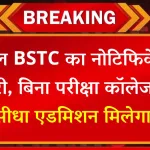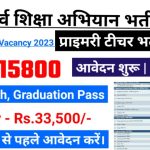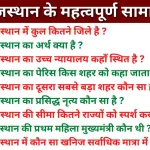The Basic School Teaching Certificate (BSTC) exam, officially known as the Pre D.El.Ed. examination, is a state-level entrance test conducted in Rajasthan. It serves as a gateway for aspiring teachers to enroll in the Diploma in Elementary Education (D.El.Ed.) program, which prepares candidates to teach at the primary and upper primary levels. Understanding the BSTC syllabus is crucial for effective preparation and success in the exam.
Section-Wise Breakdown of BSTC Syllabus 2023
1. Mental Ability (50 Questions – 150 Marks)
This section assesses the candidate’s logical reasoning and analytical skills. Key topics include:
-
Analogy: Identifying relationships between pairs of words or concepts.
-
Discrimination: Differentiating between similar-looking options.
-
Logical Thinking: Applying logic to solve problems.
-
Relationship: Understanding familial and other relationships.
-
Analysis: Breaking down complex information into simpler parts.
2. Rajasthan General Knowledge (50 Questions – 150 Marks)
This section tests the candidate’s awareness of Rajasthan’s history, culture, and current affairs. Topics covered:
-
Historical Aspects: Major events and figures in Rajasthan’s history.
-
Political Aspects: Governance and political developments.
-
Art, Culture, and Literature: Folk dances, music, and literary contributions.
-
Economic Aspects: Agriculture, industries, and economic policies.
-
Geographical Aspects: Physical features, climate, and natural resources.
-
Public Life and Social Aspects: Social movements and public welfare schemes.
-
Tourism Aspect: Important tourist destinations and festivals.
3. Teaching Aptitude (50 Questions – 150 Marks)
This section evaluates the candidate’s potential as a teacher. It includes:
-
Teaching Learning Leadership Quality: Understanding educational leadership.
-
Social Sensitivity: Awareness of societal issues and inclusivity.
-
Creativity: Innovative thinking in teaching methods.
-
Communication Skills: Effective verbal and non-verbal communication.
-
Professional Attitude: Ethics and responsibilities in teaching.
-
Continuous and Comprehensive Evaluation: Assessment techniques and student evaluation.
4. Language Ability
a. English (20 Questions – 60 Marks)
English proficiency is mandatory for all candidates. Topics include:
-
Comprehension: Understanding and interpreting passages.
-
One Word Substitution: Replacing phrases with single words.
-
Proofreading: Identifying and correcting errors.
-
Narration: Direct and indirect speech.
-
Sentence Completion: Filling in blanks appropriately.
-
Prepositions and Conjunctions: Correct usage in sentences.
-
Correction of Sentences: Improving sentence structure.
-
Types of Sentences: Declarative, interrogative, imperative, and exclamatory.
-
Tenses: Proper verb usage.
-
Vocabulary: Synonyms, antonyms, and word meanings.
-
Articles: Usage of ‘a,’ ‘an,’ and ‘the.’
-
Spelling Errors: Identifying and correcting misspelled words.
b. Hindi or Sanskrit (30 Questions – 90 Marks)
Candidates choose between Hindi and Sanskrit based on their preference.
Hindi Topics:
-
Synonym and Antonym Words: Understanding word meanings.
-
Rhyming Words: Identifying words with similar sounds.
-
Sentence Construction: Forming grammatically correct sentences.
-
Correction of Words & Sentences: Improving language accuracy.
-
Idioms and Proverbs: Common phrases and their meanings.
-
Noun, Samas, Prefix, Suffix: Grammar components.
Sanskrit Topics:
-
Character Idea: Understanding Sanskrit letters.
-
General Knowledge: Basic awareness related to Sanskrit.
-
Word Form: Formation and usage of words.
-
Prefix and Suffix: Grammar elements.
-
Samas: Compound words.
-
Gender, Dividers, Nouns: Grammar rules and applications.
Examination Pattern
-
Total Questions: 200
-
Total Marks: 600
-
Duration: 3 hours
-
Question Type: Multiple Choice Questions (MCQs)
-
Marking Scheme: Each correct answer awards 3 marks.
-
Negative Marking: No negative marking for incorrect answers.
-
Language: The exam is conducted in both English and Hindi.
Recommended Study Materials
To prepare effectively for the BSTC exam, candidates are advised to refer to:
-
Official BSTC Syllabus PDF: Available on the official website.
-
Previous Year Question Papers: To understand the exam pattern and frequently asked questions.
-
Standard Textbooks: NCERT books for general knowledge and language proficiency.
-
Online Resources: Educational platforms offering mock tests and practice questions.
Preparation Tips
-
Understand the Syllabus: Familiarize yourself with each section and its topics.
-
Create a Study Plan: Allocate time for each subject and stick to the schedule.
-
Practice Regularly: Solve previous year papers and take mock tests.
-
Focus on Weak Areas: Identify and improve upon topics you find challenging.
-
Stay Updated: Keep abreast of current affairs, especially related to Rajasthan.
FAQ for BSTC Syllabus 2023
Q1: What is the total number of questions in the BSTC exam?
A: The BSTC exam comprises 200 multiple-choice questions.
Q2: How many marks is the BSTC exam worth?
A: The exam is worth a total of 600 marks.
Q3: Is there any negative marking in the BSTC exam?
A: No, there is no negative marking for incorrect answers.
Q4: What is the duration of the BSTC exam?
A: The exam duration is 3 hours.
Q5: Are there any mandatory subjects in the BSTC exam?
A: Yes, English is mandatory for all candidates. Additionally, candidates must choose between Hindi and Sanskrit.
Q6: Where can I find the official BSTC syllabus?
A: The official BSTC syllabus is available on the official website.
Latest Posts
- Step-by-step guide to download and apply for jee mains admit card 202
- Comprehensive 2025 government holidays and recruitment details for job seekers
- JEE Mains Admit Card 2025: Your Step-by-Step Guide to Downloading the Hall Ticket
- Everything You Need to Know About 2025 Government Holidays Recruitment
- Comprehensive Guide to rrb d group recruitment 2025 – Eligibility, Vacancies, and Application
- Detailed guide to nps trust recruitment 2025 vacancies, eligibility and apply process
- Comprehensive guide to hpcl recruitment 2025 notification, vacancies, and application process
- ignou bed admission 2025 complete recruitment guide with eligibility and process
- Comprehensive Guide to Indian Army Agniveer Recruitment 2025 Notification and Jobs
- Everything You Must Know About CBSE Board Exams 2025 Changes & New Rules




